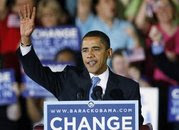Still, voters in Kentucky's primary election sent the Illinois senator a sound defeat, as Hillary Clinton took the contest by more than a two-to-one margin. Pundits were quick to argue that Clinton's victory in the Bluegrass state further vindicates her argument that Obama simply has trouble appealing to, and identifying with, working-class voters. In my piece this evening, however, I hope to debunk this claim by showing that Obama is well aware of, and has devoted a great portion of his personal and professional life to, becoming more familiar with the cause of low- and middle-income families from across the country.
With this said, let's move into the piece.
Obama v. McCain on Middle-Class Credentials:
Straight Talk Gone Awry
The purpose of this briefing is not so much to stress the superiority, and superiorly authentic, working-class credentials of Barack Obama relative to John McCain, his opponent in the upcoming
Still, demonstrating clearly that Senator Obama comes from a background that is entirely more rooted in middle-class, middle-income America than his GOP opponent does provide a powerful rebuke to criticisms levied by the McCain Campaign that Obama is unable to relate to ordinary Americans. And therein lies this paper’s objective. I hope to show, through a clear analysis of the economic and social backgrounds of Senators McCain and Obama, that the latter is at least as in touch and has more experience with the experiences of middle-class citizens than the former. In doing so, I seek to mute, or at least invalidate, suggestions that Obama will struggle to win over moderate and socially conservative blue-collar voters due to a fundamental and irreparable disconnect in background.
I’ve grown a little perturbed, and more than a bit confused, by suggestions made with increasing strength in recent weeks that Senator Obama runs the risk of losing out on the votes of working class Americans due to an ability to connect with, or relate to, the concerns, worries, and hopes they face. Such criticisms have come both within the context of Obama’s protracted battle with Senator Hillary Rodham Clinton for the Democratic nomination, as well as in speculation as to what an electoral contest might look like against presumptive GOP nominee, John McCain.
First off, let’s be clear: none of the three remaining candidates for president is hurting for income. Senator Obama, along with the salary of a United States Senator, served as a tenured professor at the
Still, when one takes into account the candidates’ backgrounds, it quickly becomes clear that, at least for one candidate, things have not always been quite so cushy. Let’s begin with McCain. The senior senator from 
In her first year at 
Barack Obama’s story, however, is unique. The son a of a single mother (his father, a Kenyan immigrant to the United States, died when he was two), Obama spent most of his childhood hopping from home to home, living abroad for several years in Indonesia before returning to the U.S. To make ends meet, Obama’s mother often relied upon food stamps, an experience surely shared by neither of his presidential opponents. Moreover, after graduating from
Moving against the wind, Obama fought inertia and an altogether unhelpful political climate to turn large pieces of the Southside around and move them on the course to a brighter future. It was in these days of grassroots organizing that Obama solidified himself as a capable, results-oriented progressive leader. However, it was also in these days when the future senator and presidential candidate also experienced first-hand the significant and, at times, overwhelming financial restraints that challenge hard-working families across the
As for his opponents, noble service was the norm, and they are to be congratulated for it. McCain endured intense torture at the hands of the North Vietnamese after having been shot down over the Vietnamese capital of
Hillary Clinton spent her immediate post-undergraduate years pursuing graduate work at
After agreeing to marry Bill Clinton, Rodham moved to
What is clear from this analysis is that, while both John McCain and Hillary Clinton served their country valiantly immediately after college, neither faced the type of financial hurdles faced by Barack Obama. This is in no way intended to downgrade the importance of the work done by McCain or Clinton. Quite the contrary, risking his life and enduring years of torture in order to implement the
Still, Senator Obama knows what it’s like to struggle economically. He and his mother know the insecurity and anxiety that accompany living paycheck to paycheck. He identifies with the cause of financial constraint because he’s lived it. He is devoted to helping folks attain a more stable way of living because he’s done it. And, in the final analysis, there is no one for whom President Obama would work more diligently than the same common folks who’ve built the backbone of America because, well, he is them.

No comments:
Post a Comment